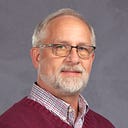Monmouth College’s ‘father of chemistry’
Ten years after his death, Kieft’s legacy remains strong
By Jeff Rankin, Monmouth College Historian
Monmouth College’s modern chemistry department was born in 1893 with the hiring of a bright young scientist named John Nesbit Swan. Over the next 22 years, Swan would build a model chemistry program and design a science building that would remain in use until the 1970s. Swan’s remarkable legacy also included siring three sons, each of whom became an accomplished chemist in his own right.
Sept. 16 marked the 10th anniversary of the passing of another memorable Monmouth chemistry professor, who was inspired to pursue that vocation by his father, a legendary professor at Bucknell University who chaired its chemistry department for 25 years.
Richard Lester Kieft, affectionately known as “Doc,” was born in Danville, Pa., in 1945 and followed in his father’s footsteps by majoring in chemistry at Dickinson College and earning a Ph.D. in the discipline from the University of Illinois. After teaching for two years at Tulane University as a postdoctoral associate, Doc came to Monmouth College, where he would remain for the rest of his life.
I got to know Doc early in that long tenure, sharing a cross-country car ride with him in the fall of 1977. I was a college student driving back to my school in New York, and he hitched a ride in order to visit his parents in Lewisburg, Pa. I had the pleasure of spending the night in the Kieft family home and getting to meet his parents, Lester and Norma.
One of my strongest memories of that visit was the pride Doc took in being the son of those loving parents, and particularly the fact that he was carrying on his father’s legacy in teaching chemistry to undergraduates at a liberal arts institution. That impression was further strengthened in 2005 when Doc enlisted my assistance to create a 93rd birthday present for his father.
Using a vintage black-and-white photo of Lester Kieft as a model, I was asked to photographically duplicate the image — a chemistry class demonstration — with Doc performing the demonstration in place of his dad. Doc had been eager about the project for several months, and when we finally got it scheduled he took great joy in locating the proper vintage instruments from the chemistry storage room to properly recreate the scene.
The result was a photo montage titled “Like Father, Like Son,” with Lester at the top and Doc at the bottom. Doc was visibly thrilled with the image, as was his father, who would die the following year. It was clear that there was a mutual admiration between father and son.
Because he never married, Doc did not have the opportunity to pass his love for chemistry and exuberance for life on to his children as had Professors Swan and Lester Kieft. While Doc lived, his students served as his surrogate children, benefiting from both his gift for teaching and his fatherly advice.
Doc’s influence also extended beyond the classroom, in his role as faculty adviser to the Zeta Beta Tau fraternity, which he served for 25 years. For 15 years, he also served as faculty athletic representative and in that capacity attended dozens of games each year, supporting athletes with as much enthusiasm as would their parents.
Evidence for Doc’s talent for teaching is plentiful. He was Monmouth’s first recipient, in 1988, of the Sears-Roebuck Foundation Award for Teaching Excellence and Campus Leadership. In 1995, the student body selected him as Professor of the Year. In 2002, Monmouth created the Garrett W. Thiessen Chair of Chemistry, and Kieft was the first professor honored with the position.
One of Doc’s most remarkable achievements — and one for which he was most proud — was being elected to the College’s board of trustees in 2006, while still a member of the faculty. Sadly, he would not serve out his four-year term, as he was diagnosed with pancreatic cancer in 2008, and died Sept. 16, 2009, after a valiant fight against the disease.
For a professor to serve as a college trustee is unusual, but Doc went beyond unusual in planning his legacy to Monmouth College. Because he left no heirs and because his entire adult life was lived in modest circumstances — one of his few indulgences was international travel — he managed to accumulate a significant amount of wealth for a professor at a small college.
The majority of Doc’s $2.3 million estate was left to future generations of Monmouth College chemistry students. A unique summer program allows 10 or more talented students to spend eight weeks on campus each year conducting serious scientific research under the supervision of professors, receiving housing and a cash stipend. The Kieft estate also funds travel to national chemistry meetings, the Garrett W. Thiessen Chair of Chemistry, modern laboratory equipment and a prestigious scholarship.
Doc Kieft’s legacy will be celebrated Oct. 18–19 during Homecoming weekend, when he will be inducted into the Fraternity and Sorority Hall of Fame, receiving the Order of Omega award for his service to Zeta Beta Tau fraternity.
